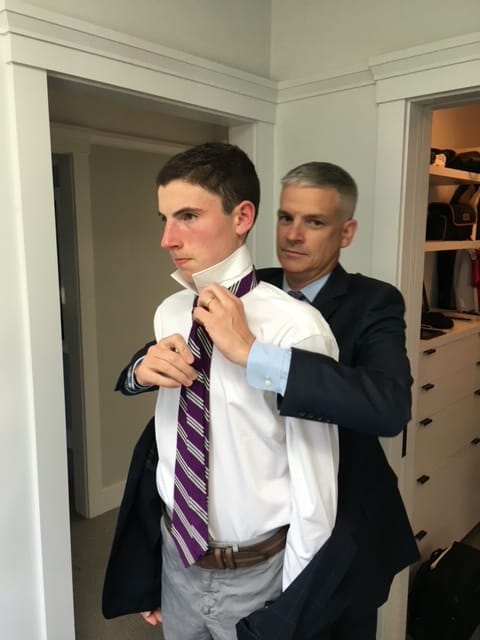What is the Deal with Fathers?
When Did They Start Getting Good?

I don’t understand fathers very well. My father moved out when I was nine and was mostly out of the picture for my childhood. We lived with my grandparents for a few years. My Pop was always home for dinner but between the time he arrived home and the time we sat down to eat, he would be in the living room with a box of Cheez-Its and a pitcher of Manhattans, and we were not allowed to bother him. Looking back, it was an ideal set-up that I would LOVE for myself now, but it wasn’t exactly engaged parenting.
I also wonder when we (and by that I mean creators and therapists and anyone involved in culture) started asking men about their fathers. And when did we start judging fathers by a standard higher than, ‘Does he work for a living and come home after work’? I think the tide has turned on what constitutes a good father, and more men are striving to be something better than their forebears in terms of emotional availability, but it’s a shift that’s happened in my lifetime, I think.
Kids in the books I read didn’t have fathers that were around. Harriet the Spy’s dad worked all day and went out at night, and was only around long enough to teach Harriet what a “rat fink” was. The kid in Dear Mr. Henshaw had a long-haul trucker for a father, and he only appeared once for maybe an hour in the whole book. The father in Fantastic Mr. Fox was a good guy, but pretty atypical, what with his poaching, and Charlie had at least one grandpa who would get out of bed for him. Was Roald Dahl the only writer who could imagine a character who knew how to father? I guess Ramona Quimby’s dad was alright, but he was unemployed and that was communicated as a major drag - a dad who was out of step in a 70s kind of way that everyone hoped was temporary. Even Meg’s father in A Wrinkle In Time, who was a really good guy, left his family for years to jump through the space-time continuum, and then his daughter, her boyfriend, and three ghost-angel-beings had to save him. Meg also had to save her little brother. Hashtag older sisters, amiright? I read hundreds of books when I was a kid so I’m sure that there were others that had good fathers in them; none of them are memorable enough to jump out at me right now.
Fathers in television shows were more likely to model the traditional fathering values that society expected from men. Fathers worked all day and came home to some dilemma that had arisen in the prior 16 minutes of the show, and then resolved it with Mother’s help: My Three Sons, Leave It To Beaver, and so forth. Archie Bunker was another “model” father. We understood he was satire but his antithesis was the geeky loser son-in-law who had “feelings.” Homer Simpson has been bumbling and incompetent since approximately the same year my parents divorced. Cliff Huxtable was a viable candidate for a good father until Bill Cosby stained the fictional doctor’s good name.
The other day, I watched Turn Every Page - The Adventures of Robert Caro and Robert Gottlieb out of curiosity about Caro’s writing process and Gottlieb’s editing process. I learned a little about that but more interesting to me was that both men, along with Lyndon B. Johnson, the focus of their decadeslong partnership, had father issues. Gottlieb’s father worked all the time and barely spoke to his son when he was home. Caro described his father as “very silent.” LBJ’s father, according to Caro, drove the family into poverty and was likely abusive, notwithstanding LBJ’s mythologizing of the man.
What stuck out to me was that, at ages 85 (Caro) and 91 (Gottlieb), both men were still able to recall the negative impacts their fathers had on them. Partly this might have been elicited by the filmmaker, who was Lizzie Gottlieb, daughter of one of the subjects, but it means that we probably never ever shed who our father was to us, even when nearly three-quarters of a century has passed.
For the past seven years, I’ve been writing a memoir about my relationship with my own father. In that process, I’ve had a secret hope that once the story was complete and lovingly polished by a great editor (father figure), my father’s impact on me would diminish to an infinitesimally small point, but the fact that Caro and Gottlieb, and probably LBJ, carried their father’s absence late into their lives, makes me wonder. How can these men who are gone for so much of our lives, who were expected to do so little, matter so much?
I can’t answer that. Maybe one of you can. tl;dr: Guys, be good dads, please.


